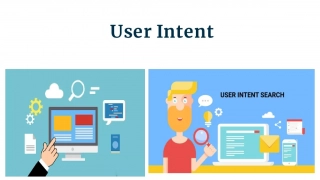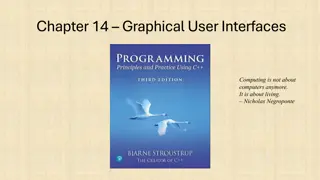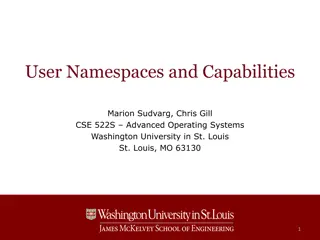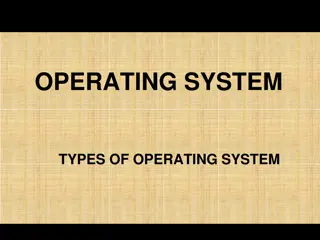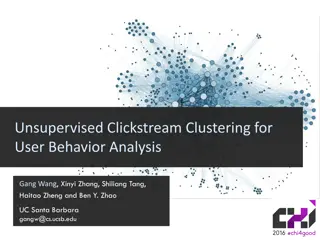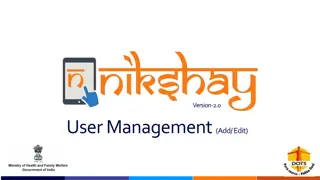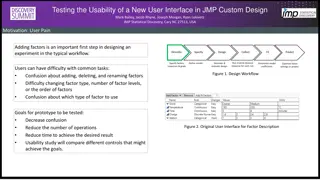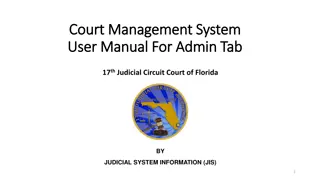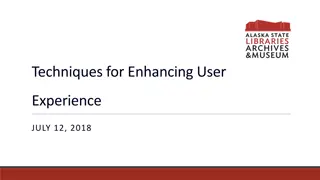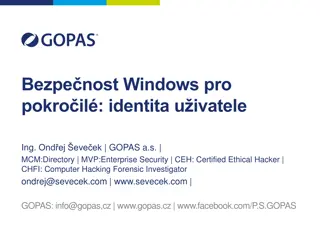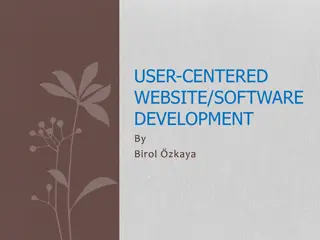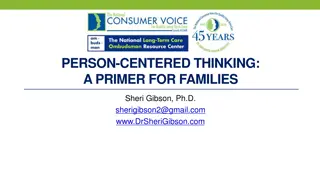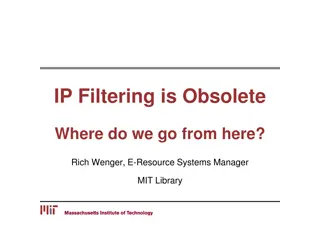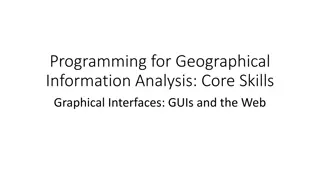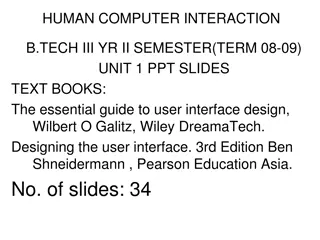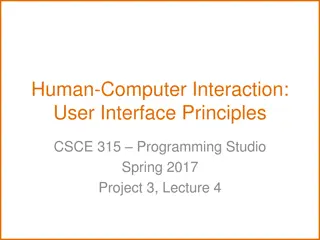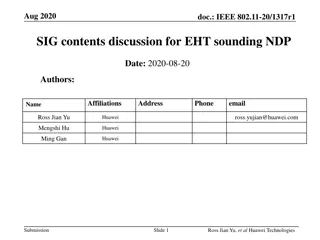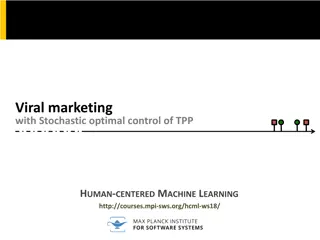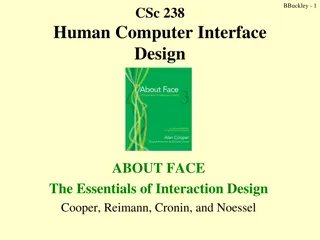Maximizing Impact: The Role of Rich Snippets in SERPs"User Intent
User intent, also known as search intent, refers to the underlying goal or purpose a user has when performing an online search. It goes beyond the literal interpretation of keywords and focuses on understanding why a person is searching. Recognizing and catering to user intent is crucial for creatin
3 views • 10 slides
Safeguarding Focal Point Training: Person-Centered Approach and Confidentiality
Understanding the principles of a person-centered approach, confidentiality, and consent is crucial in safeguarding training. This training focuses on addressing safety concerns, conducting investigations, and maintaining confidentiality. Ground rules ensure respectful participation and sensitive is
0 views • 24 slides
Operating Systems
An operating system is a crucial program that manages all other programs on a computer. It handles tasks like input recognition, file management, and device control. There are different types of operating systems such as single-user, single-task systems, multi-user, multi-task systems, real-time ope
6 views • 11 slides
The Evolution of Graphical User Interfaces in Computing
Graphical User Interfaces (GUIs) have transformed computing into a more user-friendly and interactive experience, emphasizing the shift from technology-focused to human-centric living. This chapter delves into the various aspects of GUIs, including I/O alternatives, common GUI tasks, programming per
1 views • 32 slides
Understanding Linux User Capabilities and Namespace Management
Linux user namespaces and capabilities play a critical role in managing system security and permissions. Users and groups are assigned unique IDs, and processes are associated with the user's ID. The kernel enforces permission checks based on user IDs and group IDs, allowing root access to bypass ce
0 views • 14 slides
Person-Centered Thinking in Direct Care Services
Providing Person-Centered Care is essential, especially during challenging times like COVID-19. This training focuses on understanding residents' needs, using behavioral and nonverbal indicators to improve care quality, and embracing a strength-based approach. Learn about Person-Centered Thinking, C
0 views • 24 slides
Understanding Heuristic Evaluation in User Interface Design
Heuristic evaluation is an analytical method where experts evaluate interfaces based on usability principles. This evaluation helps in identifying potential design issues that may impact user satisfaction. The process involves a small group of evaluators reviewing the interface against a set of reco
5 views • 12 slides
Understanding Different Types of Operating Systems
An operating system is the crucial program that manages a computer's resources and acts as an interface between the user and the machine. Various types of operating systems exist, including real-time, multi-user vs. single-user, multi-tasking vs. single-tasking, distributed, and embedded systems. Re
1 views • 11 slides
Understanding Human-Centered Design in ISO 9241-210 by Albrecht Schmidt
Explore the differences between User-Centered Design (UCD) and Human-Centered Design (HCD) as per ISO 9241-210 standards. Delve into the principles and activities of HCD, the rationale for adopting it, and its significance within interactive systems. Learn why HCD emphasizes the holistic perspective
0 views • 17 slides
Implementing Alert Messages and User Input Handling in Java
This tutorial guides you through creating alert messages, handling user input, defining functions, calling functions from the `onCreate` method, and creating an XML file for user data entry validation in Java. Learn how to display alerts for empty user credentials and process user actions accordingl
1 views • 6 slides
Unsupervised Clickstream Clustering for User Behavior Analysis
Understanding user behavior in online services is crucial for businesses. This research focuses on utilizing clickstream data to identify natural clusters of user behavior and extract meaningful insights at scale. By analyzing detailed user logs, the study aims to reveal hidden patterns in user inte
0 views • 19 slides
Domain-Specific Visual Analytics Systems: Exploring Expert User Insights
This presentation delves into domain-specific visual analytics systems focusing on political simulation, wire fraud detection, bridge maintenance, and more. It emphasizes leveraging user expertise for effective system design and evaluation, highlighting the importance of user insights in data analys
0 views • 27 slides
Efficient User Management System for Health Facilities
Record and manage user details effectively with the new Version 2.0 User Management feature. RNTCP has now registered over 35,000 PHIs, 140,000 Private Health Facilities, 15,000 Private Labs, 31,000 Private Chemists, across 700 Districts and 8,000 TUs in Nikshay. Enhance operations by editing TU pro
0 views • 26 slides
User Roles and Responsibilities Overview
The user roles within the application are categorized into Account Manager, Data Steward, and Common Functionality roles. Each role comes with specific responsibilities such as managing user accounts, database management, data stewardship, incident management, and more. Non-privileged roles provide
0 views • 11 slides
Understanding Agile User Stories in Software Development
Agile user stories play a crucial role in software development by providing short descriptions of features desired by customers in a language they understand. This method allows for agile planning, efficient documentation, and effective communication between development teams and clients. Extracting
0 views • 30 slides
Understanding Person-Centered Planning for Individualized Program Plans
Explore the core values, importance, and practical applications of person-centered planning in developing Individual Program Plans (IPPs) for individuals with developmental disabilities. Learn about the required process, underlying values, different approaches, and the influence of person-centered p
4 views • 11 slides
Understanding Person-Centered Planning for Future Success
Person-centered planning is a creative process that helps individuals, such as young adults, develop plans for how they want to live in the future. It involves aligning visions, goals, and actions while focusing on the person's strengths, relationships, and community involvement. Unlike traditional
0 views • 45 slides
Understanding Person-Centered Care in Healthcare Research
Explore the concepts of person-centered care in healthcare research, focusing on key differences from problem-oriented care, emerging research questions, methodological considerations, and implications for study populations, interventions, and outcomes. Learn about the definition of patient-centered
2 views • 52 slides
Exploring Usability Testing of New Interface in JMP Custom Design
In this study by Mark Bailey et al. from JMP Statistical Discovery in the USA, the focus lies on testing the usability of a new user interface using JMP Custom Design. The researchers highlight the significance of adding factors in the initial experiment design workflow to enhance user experience. U
0 views • 8 slides
Guide to Court Management System User Administration
Learn how to effectively manage user profiles, create sub-user accounts for legal assistants, update user information, and create associates' accounts in the Court Management System for the 17th Judicial Circuit Court of Florida. Detailed instructions provided for changing usernames, passwords, and
0 views • 15 slides
Enhancing Group Communication and Facilitation Techniques
Effective two-way communication is essential for facilitating group activities, negotiating, resolving conflicts, and engaging in online communications. Understanding group behaviors such as task-centered, people-centered, and self-centered can help in effectively managing meetings and group interac
0 views • 18 slides
Enhancing User Experience Through Data Trails and Metrics
Andrea Thompson, a Sr. User Experience Manager at The Home Depot, highlights the importance of measuring and analyzing user experience metrics to understand and improve customer interactions. By investigating data trails from various touchpoints, such as customer sign-ups, interactions with associat
0 views • 17 slides
Techniques for Enhancing User Experience in Public Libraries
Reimagine the public library as a community hub that promotes development and learning. Explore designs that impact user experiences, from open spaces to creative learning environments. Discover user-centered design processes and the significance of touchpoints in shaping customer perceptions.
0 views • 45 slides
Understanding User Identity and Access Tokens in Windows Security
Delve into the intricate world of user identity and access tokens in Windows security. Explore how user identities are represented, the structure of access tokens, and the significance of processes running under different user contexts. Gain insights into advanced Windows security principles and lea
1 views • 13 slides
Understanding User and Group Permissions in Linux Systems
Linux uses user and group permissions to control access to files, directories, and peripherals. Users are managed for security purposes by limiting access, with the root user having full system access. Grouping users into groups with specific access grants can enhance security. Each file is owned by
0 views • 23 slides
Principles and Schemes of User-Centered Website Development
User-centered website development focuses on goals of human-computer interaction, content organization, and visual organization. Explore safety, utility, effectiveness, efficiency, usability, and appeal. Learn about different organizational schemes like alphabetical, chronological, geographical, top
0 views • 20 slides
Understanding Person-Centered Thinking for Families
Person-Centered Thinking is essential for supporting loved ones in long-term care settings. This primer explores the impact of Person-Centered Thinking on individuals, how to recognize its effectiveness, and ways to promote a culture change in care communities. By prioritizing respect, dignity, info
0 views • 20 slides
Evolution of User Authentication Practices: Moving Beyond IP Filtering
The article explores the obsolescence of IP filtering in user authentication, highlighting the challenges posed by evolving technology and the limitations of IP-based authentication methods. It discusses the shift towards improving user experience and addressing security concerns by focusing on user
0 views • 22 slides
Introduction to Graphical User Interfaces (GUIs) in Python for Geographical Information Analysis
This content provides insights into creating Graphical User Interfaces (GUIs) in Python for Geographical Information Analysis. It covers the basics of GUI development using TkInter and event-based programming with a focus on user experience design and functionality. The lecture emphasizes the import
0 views • 45 slides
Importance of Human-Computer Interaction (HCI) in User Interface Design
Human-Computer Interaction (HCI) is a crucial discipline focusing on creating interactive computing systems that are user-friendly and efficient. This involves designing, evaluating, and implementing systems that cater to users' needs, ultimately improving user satisfaction and productivity. The fie
0 views • 39 slides
User Interface Design Principles in Human-Computer Interaction
User interface design principles are crucial in Human-Computer Interaction. This content highlights key principles such as aesthetics, anticipation, autonomy, and color consideration for users with color blindness. It emphasizes the importance of user testing, user autonomy, and providing essential
0 views • 24 slides
Understanding Interaction Design in Human-Computer Interaction
Interaction design focuses on creating interactive products that are easy, effective, and enjoyable to use. It aims to reduce negative user experiences while enhancing positive ones. Designing interactive products requires understanding user activities, interfaces, and device arrangements to support
0 views • 11 slides
IEEE 802.11-20/1317r1 EHT-SIG Proposal Discussion
The document discusses EHT-SIG for single-user and sounding NDP in IEEE 802.11-20/1317r1, focusing on overflow bits, user fields, CRC, and tail formats. It covers the format details, subfields, and overhead compared to HE sounding, proposing specific bit allocations for different elements. The EHT-S
0 views • 16 slides
Family Centered Services of CT: Empowering Youth through TOP Sessions & Community Service
Family Centered Services of CT, led by Executive Director Cheryl Burack, offers a nationally-replicated youth development program focusing on teen pregnancy prevention and academic success. Through TOP Sessions, 15-17-year-olds engage in guided discussions, community service learning, and individual
0 views • 8 slides
Optimizing User Behavior in Viral Marketing Using Stochastic Control
Explore the world of viral marketing and user behavior optimization through stochastic optimal control in the realm of human-centered machine learning. Discover strategies to maximize user activity in social networks by steering behaviors and understanding endogenous and exogenous events. Dive into
0 views • 15 slides
Administrator Deletes User - User Management System Storyboard
An administrator navigates through a user list, selects a user for deletion, confirms the action, and successfully removes the user from the system. The process involves interacting with user details, confirming the deletion, and updating the user list accordingly in a structured manner.
0 views • 4 slides
Enhancing Care Coordination for Improved Patient Referral Experiences
Explore the importance of patient-centered referral experiences, highlighting the impact of effective care coordination on patient outcomes. Contrasting cases illustrate the difference between non-patient-centered and patient-centered referral processes. Learn actionable steps to ensure all stakehol
0 views • 52 slides
ICPAC Guide to Co-produced Climate Services
ICPAC has extensive experience in bridging science and application in climate services, leading to the creation of the ICPAC Guide to Co-produced Climate Services. This guide illustrates practical ways of applying co-production approaches in the Eastern Africa region, emphasizing multi-stakeholder e
0 views • 5 slides
User Interface vs User Experience: Understanding the Essentials
Exploring the distinctions between User Interface (UI) and User Experience (UX) in human-computer interaction design. UI focuses on the space of interaction between humans and machines, while UX encompasses users' behavior, attitude, and emotions towards a product or service. The goal is to create i
0 views • 63 slides
Understanding Context Switching and User-Kernel Interaction in Operating Systems
Context switching in operating systems involves a seamless transition between user-level threads without the kernel's awareness. User-level code manages register state and stack pointers, while user-kernel mode switching requires changing processor privilege levels and agreement on information excha
0 views • 25 slides
